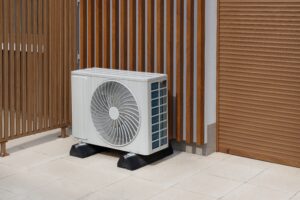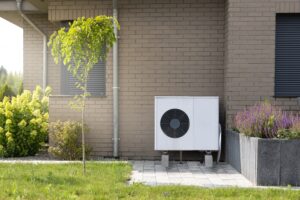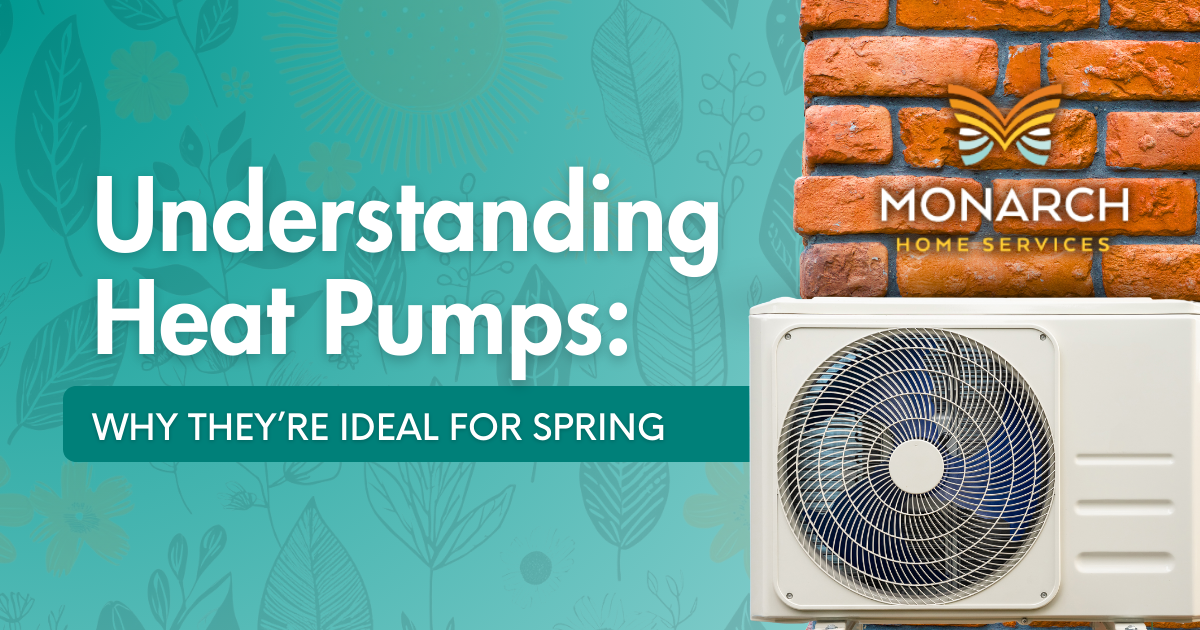With weather fluctuating from chilly nights to hot afternoons, it can be difficult to maintain the perfect home temperature in spring. Fortunately, heat pumps offer an ideal solution — heating and cooling power with low utility costs. We’ll explore the benefits of heat pumps in spring and learn how heat pumps work in different seasons. We’ll also take a look at heat pumps vs. traditional HVAC systems so you can find the best solution for your home.

Why Heat Pumps Are Perfect for Spring
Spring in Bakersfield typically ranges from 68 to 88 degrees, making heat pumps the perfect temperature solution. Heat pump efficiency is at its best at these temperatures, meaning you can save significantly on your utility bills compared to using a furnace or air conditioner.
Heat pumps are also versatile — rather than needing two separate systems to heat and cool your home, a heat pump can do both. This means that even with spring temperature fluctuations, your system can automatically adjust to keep your home at the perfect comfort level.
How Heat Pumps Work Year-Round
Heat pumps work by moving heat, or thermal energy, from one place to another. Normally, heat naturally moves from hot areas to cooler places. Heat pumps use power to reverse this process so you can control the flow of thermal energy.
Heat Pumps in Summer
In summer, your heat pump takes the heat from inside your home and transfers it outside. The most common type of heat pump is the air-source heat pump, which takes thermal energy from the air and moves it to a second location — in this case, outdoor air.
Heat Pumps in Winter
Even in cold temperatures, there’s always some thermal energy in the air and the ground. In winter, your heat pump extracts this thermal energy from outside and moves it indoors, increasing the temperature of your home.
Energy Efficiency and Cost Savings with Heat Pumps
Heat pumps provide energy-efficient heating and cooling that work year-round. Energy efficiency and lower utility bills are the primary reasons most people choose a heat pump over a furnace.
How Efficient is a Heat Pump Compared to Other Heating Systems?
In most cases, heat pumps are significantly more efficient than furnaces, boilers, and other common heating methods. When calculating efficiency, the measurement compares the amount of energy required to fuel the process (this could be electricity, natural gas, or other fuel sources) to the amount of heat it produces. A system with 100% efficiency would mean that all of the energy used to power the heater would go towards heating the air, with no energy lost to powering the system or other inefficiencies.
While furnaces and heaters have improved, they’re not 100% efficient. In comparison, heat pumps are usually more than 100% efficient, meaning they generate more heat than the energy used to power your pump.
How Heat Pumps Save on Energy Costs
Since heat pumps often deliver more than 100% energy efficiency, they require less energy to deliver the same amount of heat. This means that the cost of running a heat pump is less than the cost of running traditional HVAC for the same amount of heating and cooling.
The efficiency of heat pumps depends on the outside temperature. In most cases, they function at 100% efficiency or higher until the outdoor temperatures drop below 40 degrees. Below this, they’re still efficient, but they require a bit more energy to heat your home. Fortunately, with average winter lows usually only dipping to 44 degrees, heat pumps are almost always at their most efficient in Bakersfield.

Heat Pump Maintenance: Ensuring Optimal Performance
The following heat pump maintenance tips can help you keep your heat pump running at optimal performance.
Automate your Fan Settings
Running the heat pump fan continuously can wear down the motor and reduce efficiency. Set your fan to “auto” on your thermostat so your system can run on the most efficient settings.
Choose the Right Thermostat
A programmable thermostat with multistage functions is the best fit for a heat pump since it accommodates comfortable temperatures with maximum energy efficiency.
Book Annual Inspections
The Department of Energy recommends professional heat pump service at least once a year. Your technician will inspect your heat pump, check for wear and tear, and make sure that everything is set to optimal conditions.
Change the Filters
It’s recommended to change your heat pump filters every three months or as specified by the manufacturer. This improves indoor air quality and helps your heat pump run efficiently.
Is a Heat Pump Right for Your Home?
Considering a heat pump upgrade? These factors can help you decide whether a heat pump is right for your home.
Moderate Climate
Heat pumps work best in moderate climates, making them an ideal home temperature solution for areas with mild winter climates, like Bakersfield.
Space Saving
Rather than needing a separate air conditioner and furnace, heat pumps provide both heating and cooling in one efficient system. This makes them ideal if you’re looking to reduce the area taken up by your home’s temperature systems.
High Efficiency
For many people, energy efficiency is one of the key motivators to purchase a heat pump. They’re significantly more efficient than most boilers, furnaces, and air conditioners, so you’ll use less energy to heat and cool your home.
Lower Utility Costs
Since heat pumps are highly energy efficient, they also lower your energy bills. Particularly if you run a heating or cooling system frequently, your utility bill savings can be significant. Although heat pumps generally cost more upfront compared to traditional furnaces and air conditioners, utility bill savings usually make heat pumps more cost-effective in the long run.
Call Monarch for All Your Heat Pump Services
Whether you’re looking for heat pump installation, heat pump maintenance, or simply have questions about whether a heat pump is right for your home, our team at Monarch Home Services is here to help. Our experts deliver high-quality heat pump maintenance and installations, as well as plenty of information so you can find the right heating solution for your home. Contact us today to discover how a heat pump upgrade can help you save on your heating and cooling costs.


